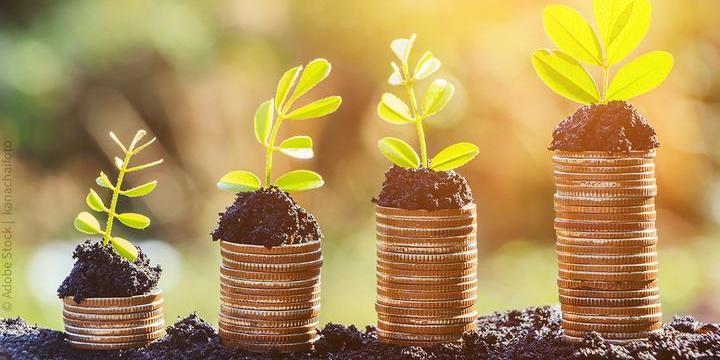

Can Economic Growth and Ecological Sustainability Coexist?
|
Expert Opinion
Is long-term economic growth compatible with ecologically sustainable development? This question stands as one of the most debated issues of our time. Over the past decades, growth driven by economic liberalization and globalization has brought prosperity to billions and reduced global poverty. However, this positive trajectory has come at a high cost to the environment and the depletion of natural resources. The limitations of economic growth at the expense of the environment are evident. Sustainable economic prosperity can only be achieved in the long run if it is coupled with ecological sustainability.
The Erosion of Our Natural Resources
Climate change remains at the core of the ecological sustainability debate. Despite fervent calls for increased climate protection, global greenhouse gas emissions continue to surge unabated. Since the year 2000, they have escalated by approximately one-third, with no sign of this trajectory coming to a halt. Equally worrisome is the alarming decline in global biodiversity. Out of all the mammals worldwide, humans and domesticated animals for food production, such as cows and pigs, account for a staggering 96 percent. Merely four percent represent the remaining wild animal population. Additionally, the numbers of insects and birds have been dwindling for years.
Deforestation plays a critical role in both climate change and the decline of biodiversity. The destruction of tropical rainforests, especially in the Amazon basin, is particularly worrisome. These forests house an extensive array of animal and plant species, underscoring their paramount importance in mitigating climate change.
The ongoing environmental degradation poses numerous challenges, but its detrimental impact is also evident from a purely economic standpoint. The British economist Partha Dasgupta regards an intact environment as a form of capital, much like human-made capital in the form of machinery or buildings, generating invaluable services. The most frequently cited example is pollination by bees. Beyond that, food production through fishing and agriculture, groundwater replenishment, CO2 absorption, the provision of recreational spaces for people, and, not least, protection against epidemics and other health risks are among the indispensable services provided by this natural capital.
Exploring the Intersection of Sustainability and Economic Growth
From this perspective, attaining sustainable development requires safeguarding our natural capital from permanent depletion and ensuring its preservation, at the very least. To achieve this, our ecological footprint, which signifies the consumption of natural resources, must not exceed the regenerative capacity of this capital. According to estimates from the Global Footprint Network, the current global ecological footprint stands at 1.7 - a staggering 170 percent of what would be sustainable for preserving our natural capital. These estimates are methodologically complex and subject to debate, leaving room for both overestimation and underestimation of the problem.
Now, let's consider the value of 1.7 to be accurate. What changes would be required to attain sustainable development? Given the current Gross Domestic Product (GDP), we would need a substantial enhancement in the efficiency of resource utilization per unit of economic output - consuming only two-thirds of what we presently claim. And this imperative applies universally. However, such efficiency improvements take time to materialize. Meanwhile, the economy continues to grow, and initially, the natural capital still diminishes. Therefore, the necessary improvements for sustainability in the form of reduced consumption of natural resources are even more significant.
Reconciling Natural Capital Consumption and Growth
How can we bring about such transformative change? Firstly, it requires a compelling measurement of our natural capital and effective communication about its significance. Secondly, we need technological innovations to reduce the consumption of natural resources in the production of goods and services. Thirdly, progress and innovations in the organization of economic and social processes are vital. This encompasses better monitoring and enforcement of environmental regulations, as well as intelligent environmental policies that avoid unnecessary cost burdens, such as tradable certificates for greenhouse gas emissions. Alongside innovations, fourthly, direct investments in natural capital are essential, such as afforestation and the establishment of conservation areas. Of utmost importance is the protection of existing tropical rainforests. Achieving all these goals is challenging, given that decisions on environmental protection are primarily made by national governments, which may be reluctant to bear the costs when the benefits accrue globally. Nonetheless, advanced countries like Germany can still contribute by developing technologies that are attractive independently of their environmental impact.
Abandoning Growth is Not the Solution
Another, less promising approach to reducing the ecological footprint would involve trying to lower the global Gross Domestic Product (GDP) or at least to renouncefurther growth. This path is favored by the so-called Degrowth movement, but it presents significant challenges. Economic growth arises from the unfettered aspirations of billions of people. Citizens, especially those in developing and emerging countries, are unlikely to forego seeking greater prosperity. Demanding such sacrifices can be morally questionable. Even in high-income countries like Germany, a policy of shrinking the economy is unlikely to garner much political support. Moreover, the willingness to allocate resources for environmental protection tends to decline when material well-being diminishes. While it's commendable when people voluntarily change their consumption patterns to reduce environmental burden through consciousness or education, such behavior changes have been exceptions so far. Therefore, aligning technological and social progress towards environmental preservation, along with investments in regenerating and conserving our natural capital, offers a more promising path towards sustainability.
Clemens Fuest
Professor of Public Economics and Finance
President of the ifo Institute
Published under the title “Verzicht rettet nicht das Klima“, Focus, August 12, 2023